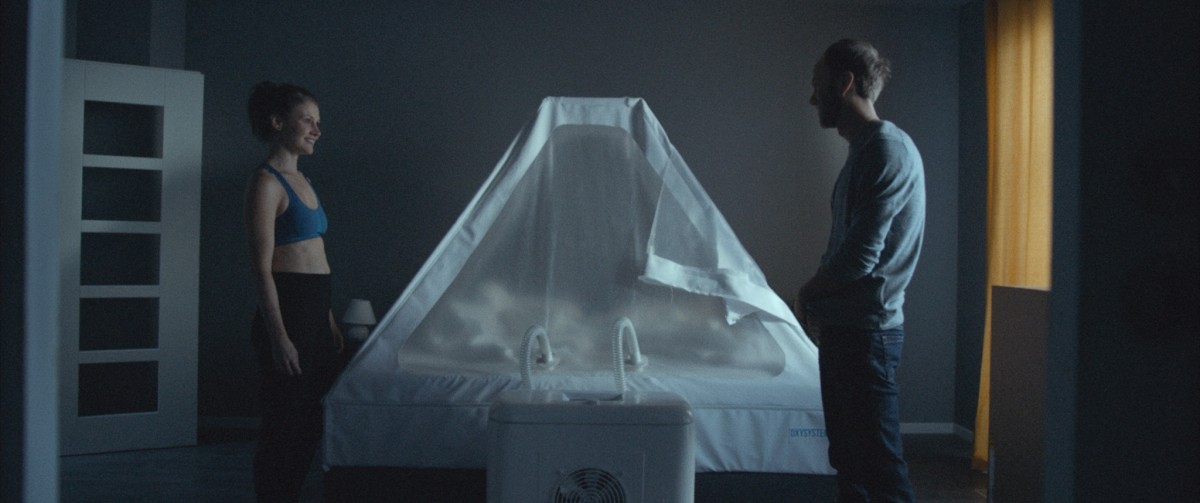Karlovy Vary Film Review: ‘Domestique’
By Peter Debruge
LOS ANGELES (Variety.com) – As classical Hollywood cinema scholars David Bordwell and Kristen Johnson pointed out, the traditional American film plot is driven by a “goal-oriented protagonist.” That’s not necessarily the case with European art cinema, which may explain why U.S. audiences have such a hard time connecting to movies where it’s not clear what the hero wants. They won’t have that problem with “Domestique,” an obsessive-compulsive Czech-Slovak body-horror film — easily the most uncomfortable first-date movie Central Europe has produced since “Wetlands” — that centers on two characters who’re as goal-oriented as they come: hard-core Roman (Jiří Konvalinka) is a training maniac, working overtime to recover from a cycling injury, while his health-nut wife Charlotte (Tereza Hofová) wants a child, keeping meticulous track of her fertility calendar.
An audaciously alienating anti-romance from first-time director Adam Sedlák, “Domestique” hardly ever leaves the sterile modern apartment where this high-strung couple co-exists (and even then, only to visit the doctor who urges Roman into a doping routine). Otherwise confined to Roman and Charlotte’s home turf, the film plunges audiences into the oppressively single-minded headspace these two characters share, focusing on their increasingly desperate self-improvement routines. We sense that there was love between them once — or perhaps just incredibly passionate sex — but four years into their relationship, each is focused not on pleasing the other but on achieving the thing he or she wants most from life.
Anyone who is (or has dated) an athlete knows the kind of intense commitment it takes to reach and maintain peak form, to say nothing of the almost Zen-like monotony of training. “Domestique” opens with the sound of a stationary bike grinding away, as Roman puts in his daily however-many kilometers. When he comes to the table, he barely seems interested in eating, much less interacting with his wife, so focused is he on getting himself to the threshold where he will be selected for the cycling team (for the moment, he doesn’t make the cut). The pair seem even more clinical in bed, where they have brisk, brusque sex on schedule, trying to take advantage of her four-day ovulation window — a process she studiously records in her fertility journal.
Granted, Roman and Charlotte may be a worst case of a couple whose personal-excellence ideals take precedence over a healthy intimacy at home (although they do bond in their own weird fashion, as in an early scene that shows her shaving his legs in the tub). But the seemingly unhealthy dynamic is not without value to spectators, holding up an unflattering fun-house mirror to the way any two partners connect.
“Domestique” begins in a familiar enough place, observing with wry irony how husbands are often the only ones to witness the decidedly unsexy beauty routines that keep their wives looking gorgeous to the outside world (goopy face masks), or the way Roman’s ridiculous dieting regimen undermines his wife’s meal-making (before eating, he literally counts the calories by weighing his dessert on a table-side food scale). Things quickly escalate to more extreme territory when Roman brings home an oxygen tent designed to improve his endurance. And then there’s the doping — injecting EPO and trying an illicit blood transfusion — which finds an analogue in her self-medicated hormone treatments.
Offering only the most minimal context on the couple’s life before the film begins, Sedlák strips their relationship down to its essence — we don’t have the slightest idea how they met or what attracts these two to each other — and then abstracts the environment they share, much as Darren Aronofsky did in last year’s “Mother!” (minus the elaborate eco-spiritual allegory). What few home furnishings they have are neutral, against which DP Dušan Husár frames the two like characters in a science-fiction movie. Attention paid to sound design further amplifies the couple’s almost robot-like routines, as in a shot from inside the oxygen tent, where Roman’s feet are backlit by a glowing red light while the device makes steady suction noises.
Frankly, it’s not terribly interesting to spend time with characters who barely seem interested in spending time with each other, although as their behavior grows stranger — as in a sequence when Charlotte advises Roman on how to binge properly, triggering a dangerous new development in which they both become bulimics — it becomes fascinating to see how far they’ll go.
For those who judge performance by what a character endures, co-leads Konvalinka and Hofová do a remarkable job in becoming horror-movie versions of their ideal selves, although that’s a superficial achievement. Stronger actors would have made it easier for us to identify with the characters, rather than grasping to understand their motivations (the cringe-inducing final act is especially unclear, as both begin emaciating themselves, presumably because Charlotte refuses to allow her husband to get thinner than her). And yet, true to its own aesthetic, “Domestique” is a stunner, the work of a perfectionist with a promising career ahead of him.

